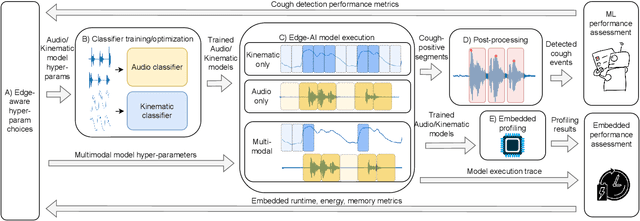Denisa Andreea Constantinescu
Cough-E: A multimodal, privacy-preserving cough detection algorithm for the edge
Oct 31, 2024



Abstract:Continuous cough monitors can greatly aid doctors in home monitoring and treatment of respiratory diseases. Although many algorithms have been proposed, they still face limitations in data privacy and short-term monitoring. Edge-AI offers a promising solution by processing privacy-sensitive data near the source, but challenges arise in deploying resource-intensive algorithms on constrained devices. From a suitable selection of audio and kinematic signals, our methodology aims at the optimal selection of features via Recursive Feature Elimination with Cross-Validation (RFECV), which exploits the explainability of the selected XGB model. Additionally, it analyzes the use of Mel spectrogram features, instead of the more common MFCC. Moreover, a set of hyperparameters for a multimodal implementation of the classifier is explored. Finally, it evaluates the performance based on clinically relevant event-based metrics. We apply our methodology to develop Cough-E, an energy-efficient, multimodal and edge AI cough detection algorithm. It exploits audio and kinematic data in two distinct classifiers, jointly cooperating for a balanced energy and performance trade-off. We demonstrate that our algorithm can be executed in real-time on an ARM Cortex M33 microcontroller. Cough-E achieves a 70.56\% energy saving when compared to the audio-only approach, at the cost of a 1.26\% relative performance drop, resulting in a 0.78 F1-score. Both Cough-E and the edge-aware model optimization methodology are publicly available as open-source code. This approach demonstrates the benefits of the proposed hardware-aware methodology to enable privacy-preserving cough monitors on the edge, paving the way to efficient cough monitoring.
 Add to Chrome
Add to Chrome Add to Firefox
Add to Firefox Add to Edge
Add to Edge